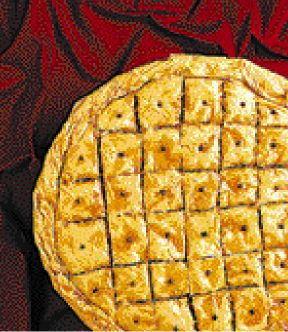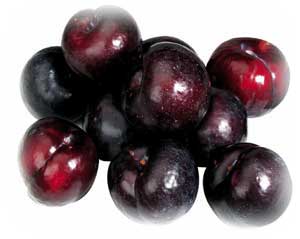 |
||
|
|
||
|
The Sweet Life by Jennifer Gay
AFTER a hearty meal, there's nothing like a bite into something sweet and succulent to "change the taste", as the Greeks say. Here, we select three very different types of traditional puddings: syrup-soaked ravani cake with a creamy yoghurt filling; dry, nutty biscuits and sugary baklava bursting with chopped almonds and walnuts. Serve with a bitter, grouty cup of coffee and glasses of ice-cold water. |
 |
|
Ravani with yoghurt (Yiaourtoravani) Ingredients Yields 12 servings 6 eggs 800gr full-fat yoghurt 300gr sugar 1 tbs butter, melted 600gr white cake flour 1 tsp baking powder For the syrup 600gr sugar 1/2 litre water 3-4 drops lemon juice Preparation 1. In mixing bowl, beat yoghurt and sugar until thick and creamy. 2. Add lightly beaten egg yolks and melted butter. 3. In separate bowl, beat egg whites until stiff. Gently fold in flour and baking powder. Stirring continuously, add egg white and flour mix to yoghurt and sugar. 4. Turn mixture into a large, shallow, lightly buttered baking dish. (Batter should not be more than one-inch thick). 5. Bake at 180 degrees Celsius for 15 minutes. Then turn off heat from top and bake, from bottom only, for 30 minutes more. 6. Remove from oven and let cool completely. Prepare syrup and pour hot over ravani cake. Nut crescents (Skaltsounia me ksirous karpous) Ingredients For the dough 2. In separate bowl, combine olive oil, eggs, salt, and water; gradually stir in enough flour to create a soft dough. Let rest for about 20 minutes. 3. Roll out dough and cut into small circles, about 9-10cm in diameter. Place a spoonful of filling in circle, then fold dough over filling to create a half-moon shape. Press dough together around edges to seal. 4. Lightly oil two baking sheets. Transfer crescents to cookie sheets and bake at 180 degrees Celsius for 50-60 minutes. 5. Remove from oven and let cool for about 15-20 minutes. Dredge with powdered sugar and ground cinnamon. Almond baklava (Baklavas me amigdala) 2. Lightly oil bottom and sides of shallow baking pan. Layer bottom with 5 or 6 sheets of filo, brushing with butter between each sheet. Let ends hang over edge of pan. 3. Spread nut filling evenly over filo. Layer remaining filo over top, always brushing with butter between each sheet. Trim excess filo and turn ends into pan. Drizzle a little butter over top. With tip of sharp knife, mark baklava into diamond-shape pieces, taking care not to pierce down to the filling. Push a clove into centre of each diamond. 4. Bake at 180 degrees Celsius for 50-55 minutes, or until filo is golden brown. Meanwhile, prepare syrup and let cool. When baklava is done, remove from oven, drizzle a little butter over top, then immediately pour cold syrup over pan. Let baklava stand for awhile to soak up syrup before cutting and serving. |
||
This week at your local laiki CULTIVATED since prehistoric times, plums were supposedly introduced into Greece by Alexander the Great from Syria or Persia where damson plums have long been grown. Prunus x domestica is the common garden plum of west Asian origin - probably specifically from the Caucasus Mountains near the Caspian Sea - misleadingly often referred to as the European Plum. Plums also originate from China and Japan and it is thought some are native to America. Often round in shape, others are oval or heart-shaped. Their colours are delicious: red-purple, blue-black, green, yellow and amber. |
 |
|
Plums (in Greek vanilies) have a high content of phytonutrients called neochlorogenic and chlorogenic acid - excellent antioxidants. Plums and prunes (retailers are now calling the latter dried plums to try and improve their image) also increase absorption of iron in the body - this is probably related to their high vitamin C content, as this vitamin is necessary for iron to be used effectively. Prunes are especially well-known for their high fibre content, while prune juice has long been used to "keep you regular". Juicy, sweet plums are eaten fresh or used for jam and preserves, while the juice can be fermented into plum wine. When distilled this produces a brandy known in Eastern Europe as Slivovitz. If prunes have been in the refrigerator, allow them to approach room temperature before consuming - you will find them much tastier and juicer. For something a little different, try sliced plums with goat cheese, sprinkled with walnuts and sage as a pizza topping. Poached plums in red wine served with lemon zest is luxurious while simple stewed plums sieved make a delicious desert served with yoghurt and honey. |
||
|
|
||
|
|
 |
|
| You can pick up your reduced price copy in person from Ellinika Grammata bookshop (9 Christou Lada St, Athens). Otherwise, email your order to ladabookstore@ellinikagrammata.gr or fax it to 210-333-3971. Include your name and address, the name of the book and the fact that you are taking advantage of this special offer. DO NOT include payment or a credit card number. A courier will deliver the book and collect payment in cash. There is a 4.50 euros delivery charge. For more information call Vassilis Tsonoglou at 210-333-3970. |
||
|
|
||
Bestcellars Wines of the week OENOLOGIST Angelos Iatridis, wine-maker of Alpha Estate, picks five dessert wines to enjoy, well-chilled, after dinner on long summer evenings. |
 |
|
|
Domaine Costa Lazaridi 2002 Viognier (Viognier), Ktima Costa Lazaridi |
||
(Posting Date 10 August 2006) HCS readers can view other excellent articles by this writer in the News & Issues and other sections of our extensive, permanent archives at the URL http://www.helleniccomserve.com./contents.html
All articles of Athens News appearing on HCS have been reprinted with permission. |
||
|
||
|
2000 © Hellenic Communication Service, L.L.C. All Rights Reserved. http://www.HellenicComServe.com |
||

